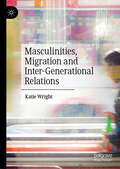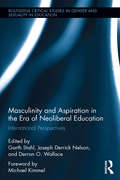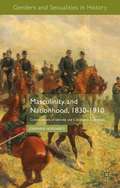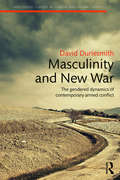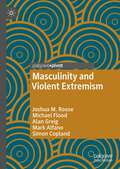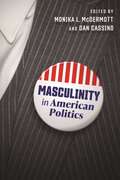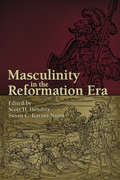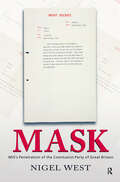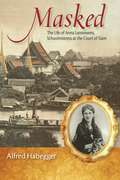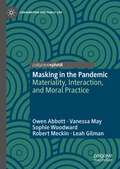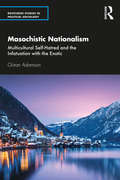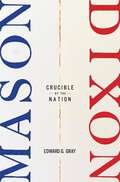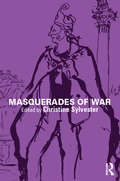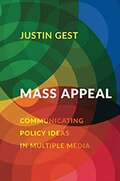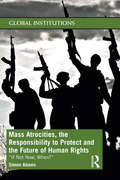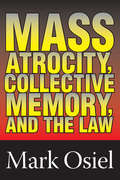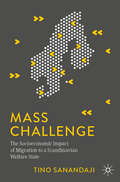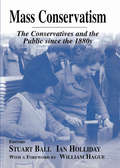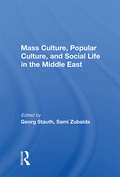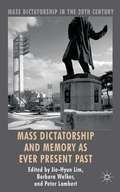- Table View
- List View
Masculinities, Migration and Inter-Generational Relations
by Katie WrightThis book examines father-son relations and their role in the transfer of forms of masculinity and fathering practices. It also explores how far the psychosocial resources transferred from fathers to sons enable sons to navigate challenges in their everyday lives, particularly in contexts of disadvantage and marginalization. This study is a successor to an earlier book examining the inter-generational transfer of human wellbeing amongst Latin American migrant women and their daughters. By extending this analysis to the case of migrant fathers and sons this book explores the impacts of international migration on constructions of masculinity and fatherhood whilst investigating the utility of resources passed intergenerationally in a different social, political and economic environment.
Masculinity and Aspiration in an Era of Neoliberal Education: International Perspectives (Routledge Critical Studies in Gender and Sexuality in Education)
by Garth Stahl Derron Wallace Joseph NelsonThis collection investigates the ways in which boys and young men negotiate neoliberal discourse surrounding aspiration and how neoliberalism shapes their identities. Expanding the field of masculinity studies in education, the contributors offer international comparisons of different subgroups of boys and young men in primary, secondary and university settings. A cross-sectional analysis of race, gender, and class theory is employed to illuminate the role of aspiration in shaping boys’ identities, which adds nuance to their complex "identity work" in neoliberal times.
Masculinity and Nationhood, 1830-1910
by Josephine HoegaertsA history of what it meant to be a man, and a citizen of an emerging nation throughout the nineteenth century. This book not only relates how Belgians were taught how to move and fight, but also how they spoke and sang to express masculinity and patriotism.
Masculinity and New War: The gendered dynamics of contemporary armed conflict (Routledge Studies in Gender and Global Politics)
by David DuriesmithThis book advances the claims of feminist international relations scholars that the social construction of masculinities is key to resolving the scourges of militarism, sexual violence and international insecurity. More than two decades of feminist research has charted the dynamic relationship between warfare and masculinity, but there has yet to be a detailed account of the role of masculinity in structuring the range of volatile civil conflicts which emerged in the Global South after the end of the Cold War. By bridging feminist scholarship on international relations with the scholarship of masculinities, Duriesmith advances both bodies of scholarship through detailed case study analysis. By challenging the concept of ‘new war’, he suggests that a new model for understanding the gendered dynamics of civil conflict is needed, and proposes that the power dynamics between groups of men based on age difference, ethnicity, location and class form an important and often overlooked causal component to these civil conflicts. Exploring the role of masculinities through two case studies, the civil war in Sierra Leone (1991–2002) and the Second Sudanese Civil War (1983–2005), this book will be of great interest to postgraduate students, practitioners and academics working in the fields of gender and security studies.
Masculinity and Violent Extremism (Global Masculinities)
by Mark Alfano Michael Flood Joshua M. Roose Alan Greig Simon CoplandThis book explores men's attraction to violent extremist movements and terrorism. Drawing on multi-method, interdisciplinary research, this book explores the centrality of masculinity to violent extremist recruitment narratives across the religious and political spectrum. Chapters examine the intersection of masculinity and violent extremism across a spectrum of movements including: the far right, Islamist organizations, male supremacist groups, and the far left. The book identifies key sites and points at which the construction of masculinity intersects with, stands in contrast to and challenges extremist representations of masculinity. It offers an insight into where the potential appeal of extremist narratives can be challenged most effectively and identifies areas for both policy making and future research.
Masculinity and the New Imperialism
by Bradley DeaneAt the end of the nineteenth century, the zenith of its imperial chauvinism and jingoistic fervour, Britain's empire was bolstered by a surprising new ideal of manliness, one that seemed less English than foreign, less concerned with moral development than perpetual competition, less civilized than savage. This study examines the revision of manly ideals in relation to an ideological upheaval whereby the liberal imperialism of Gladstone was eclipsed by the New Imperialism of Disraeli and his successors. Analyzing such popular genres as lost world novels, school stories, and early science fiction, it charts the decline of mid-century ideals of manly self-control and the rise of new dreams of gamesmanship and frank brutality. It reveals, moreover, the dependence of imperial masculinity on real and imagined exchanges between men of different nations and races, so that visions of hybrid masculinities and honorable rivalries energized Britain's sense of its New Imperialist destiny.
Masculinity in American Politics
by Dan Cassino Monika L. McDermottHow elements of masculinity manifest themselves in all aspects of American political lifeWhile hardly a new phenomenon, masculinity—which includes elements of toughness, independence, and leadership, among others—roared onto the national political stage in America with the 2016 candidacy, election, and presidency of Donald Trump. Research into masculinity dates back over a century, but little attention has been paid to the specific role of masculinity in politics beyond the conventional wisdom that it, rather than femininity, is the dominant force. This lack of research has led to a lack of knowledge on how exactly, and how much, masculinity shapes political structures, attitudes and behaviors, from children’s socialization to our masculine political world, to how a new generation views this traditional dominance.In Masculinity in American Politics, Monika L. McDermott and Dan Cassino bring together a prestigious group of interdisciplinary scholars to explore these questions and their implications for different aspects of political life. Topics include the challenge of defining and measuring masculinity, how perceptions of gender and masculinity can shape campaign messaging strategies and public opinion, and other discussions of political identity, including age, race, and ethnicity.With contributions from Melissa Deckman, Jill S. Greenlee, Amanda Bittner, and other high-profile scholars, this comprehensive volume provides insight into masculinity and its high-stakes political manifestations, particularly as Gen Z fights to redefine the contours of their own gender and sexuality. Drawing upon insights from politics, sociology, psychology, and the broader social sciences, Masculinity in American Politics pushes the field to look “beyond the binary” and illuminate this brave, new world of political conflict and possibility.
Masculinity in the Reformation Era (Sixteenth Century Essays & Studies #83)
by Scott H. Hendrix Susan C. Karant-NunnThese essays add a unique perspective to studies that reconstruct the identity of manhood in early modern Europe, including France, Switzerland, Spain, and Germany. The authors examine the ways in which sixteenth- and seventeenth-century authorities, both secular and religious, labored to turn boys and men into the Christian males they desired. Topics include disparities among gender paradigms that early modern models prescribed and the tension between the patriarchal model and the civic duties that men were expected to fulfill. Essays about Martin Luther, a prolific self-witness, look into the marriage relationship with its expected and actual gender roles. Contributors to this volume are Scott H. Hendrix, Susan C. Karant-Nunn, Raymond A. Mentzer, Allyson M. Poska, Helmut Puff, Karen E. Spierling, Ulrike Strasser, B. Ann Tlusty, and Merry E. Wiesner-Hanks.
Masculinity in the Reformation Era (Sixteenth Century Essays & Studies)
by Scott H. Hendrix Susan C. Karant-NunnThese essays add a unique perspective to studies that reconstruct the identity of manhood in early modern Europe, including France, Switzerland, Spain, and Germany. The authors examine the ways in which sixteenth- and seventeenth-century authorities, both secular and religious, labored to turn boys and men into the Christian males they desired. Topics include disparities among gender paradigms that early modern models prescribed and the tension between the patriarchal model and the civic duties that men were expected to fulfill. Essays about Martin Luther, a prolific self-witness, look into the marriage relationship with its expected and actual gender roles. Contributors to this volume are Scott H. Hendrix, Susan C. Karant-Nunn, Raymond A. Mentzer, Allyson M. Poska, Helmut Puff, Karen E. Spierling, Ulrike Strasser, B. Ann Tlusty, and Merry E. Wiesner-Hanks.
Mask: MI5's Penetration of the Communist Party of Great Britain
by Nigel WestMI5’s dramatic interception of secret signals to Moscow from a hidden base in Wimbledon uncovered the true extent of Soviet espionage in Britain. Intelligence expert Nigel West reveals how MASK, the codename for one of the most secretive sources ever run by British intelligence, enabled Stanley Baldwin and his cabinet to monitor the activities of the Communist Party of Great Britain and track wireless traffic between the Soviet Union and its Comintern representatives abroad, in countries as far apart as the United States, China and Austria. The Government Code and Cipher School was one of the most secret branches of Whitehall, under the command of the Secret Intelligence Service, and used its covert intercept station in Denmark Hill, South London to make vital advances in the intelligence war. This gripping account exposes for the first time how the Communist Party of Great Britain was infiltrated and the actual contents of its communications with the Soviets.
Masked
by Alfred HabeggerA brave British widow goes to Siam and-by dint of her principled and indomitable character-inspires that despotic nation to abolish slavery and absolute rule: this appealing legend first took shape after the Civil War when Anna Leonowens came to America from Bangkok and succeeded in becoming a celebrity author and lecturer. Three decades after her death, in the 1940s and 1950s, the story would be transformed into a powerful Western myth by Margaret Landon's best-selling book "Anna and the King of Siam" and Rodgers and Hammerstein's musical "The King and I. " But who was Leonowens and why did her story take hold? Although it has been known for some time that she was of Anglo-Indian parentage and that her tales about the Siamese court are unreliable, not until now, with the publication of "Masked," has there been a deeply researched account of her extraordinary life. Alfred Habegger, an award-winning biographer, draws on the archives of five continents and recent Thai-language scholarship to disclose the complex person behind the mask and the troubling facts behind the myth. He also ponders the curious fit between Leonowens's compelling fabrications and the New World's innocent dreams-in particular the dream that democracy can be spread through quick and easy interventions. Exploring the full historic complexity of what it once meant to pass as white, "Masked" pays close attention to Leonowens's midlevel origins in British India, her education at a Bombay charity school for Eurasian children, her material and social milieu in Australia and Singapore, the stresses she endured in Bangkok as a working widow, the latent melancholy that often afflicted her, the problematic aspects of her self-invention, and the welcome she found in America, where a circle of elite New England abolitionists who knew nothing about Southeast Asia gave her their uncritical support. Her embellished story would again capture America's imagination as World War II ended and a newly interventionist United States looked toward Asia. "
Masked Prey: Lucas Davenport 29 (A\prey Novel Ser. #30)
by John SandfordLucas Davenport investigates an anonymous threat to the children of US politicians in the latest thriller from the internationally bestselling author John Sandford. The daughter of a US Senator is monitoring her social media presence when she finds a picture of herself on a strange blog. And there are other pictures . . . children of other influential Washington politicians, walking or standing outside their schools, each identified by name. Surrounding the photos are vicious political rants from a variety of radical groups. It's obviously alarming – is there an unstable extremist tracking the loved ones of powerful politicians with deadly intent? But when the FBI is called in, there isn't much they can do. The anonymous photographer can't be pinned down to one location or IP address and, more importantly, no crime has actually been committed. Yet. There&’s only one person who has a hope of finding the person behind this, one person who can operate outside the FBI's constraints: Lucas Davenport. And he&’ll have to act first before someone gets hurt . . .***READERS LOVE THE PREY SERIES*** &‘One of the great novelists of all time&’ Stephen King &‘A series writer who reads like a breath of fresh air&’ Daily Mirror &‘John Sandford knows all there is to know about detonating the gut-level shocks of a good thriller&’ New York Times Book Review &‘John Sandford has the Midas touch&’ Huffington Post &‘Delivers twists to the very last sentence&’ Daily Mail &‘Crime writer John Sandford is one of the best around&’ Sun
Masking in the Pandemic: Materiality, Interaction, and Moral Practice (Consumption and Public Life)
by Sophie Woodward Vanessa May Owen Abbott Leah Gilman Robert MeckinThis book assumes an “everyday life” perspective towards masking in public spaces in the UK during the Covid-19 pandemic. Facemasks are perhaps one of the most tangible ways in which the changes wrought by the Covid-19 pandemic were made visible. In the space of a few months in 2020, masking in the UK went from being almost non-existent in public to becoming widespread, both before and after the UK government mandated masking in most enclosed public spaces in July 2020. In this context, the speed and scale of the introduction of masking in public settings offers sociologists a rare chance to document the (contested) emergence of a new social practice. We argue that the nature of masking during the pandemic means that masking practices need to be understood through the entwinement of material, interactional, and moral dimensions. We develop a relational perspective to explore the relationship between the materiality and moral significance of masking, and how this translated into the development of masking practices in public spaces. The authors argue further that the specific context of masking during the pandemic provides sociologists with a unique lens to think through the nature of material, interactional, and moral practices in general.
Masks of Authoritarianism: Hegemony, Power and Public Life in Bangladesh
by Arild Engelsen Ruud Mubashar HasanThis edited book investigates how life is affected by the increasingly authoritarian regime in Bangladesh.Earlier a flawed but real electoral democracy, over the last several years Bangladesh has been characterised as a ‘hybrid regime’ in The Economist’s Democracy Index. Today it is a country in which law still rules and leaders are still chosen – but only on paper. The uniqueness of this book is not in defining regime type or investigating trajectories. It is in its efforts to study how these changes affect everyday life. All chapters are based on intimate knowledge of a field, on first-hand experience, and on interviews and ethnography. This book will interest political scientists and scholars of Bangladesh, the Islamic world and beyond, with findings of broad relevance to hybrid regimes.
Masochistic Nationalism: Multicultural Self-Hatred and the Infatuation with the Exotic (Routledge Studies in Political Sociology)
by Göran AdamsonThis book examines the nature of the conflict between right-wing populism and multiculturalism: the West’s defining conflict in the modern age. Drawing on a plethora of evidence from politics and culture in the West, it argues that these two positions, while antagonistic on the surface, are in fact similar: nationalism and multiculturalism are two names for one idea, the difference between them being simply a matter of geography; both outlooks have their roots in romanticism, sentimentalism, arrogance and a racist outlook. Rather than defend either approach, this volume urges us to consider the importance of roots and argues for greater consideration of what classical liberalism, socialism and feminism can do to break this impasse in our political thinking, with a concern for equality and concern for solidarity, regardless of cultural practice. As such it will appeal to social and political theorists with interests in political sociology and culture.
Mason-Dixon: Crucible of the Nation
by Edward G. GrayThe first comprehensive history of the Mason-Dixon Line—a dramatic story of imperial rivalry and settler-colonial violence, the bonds of slavery and the fight for freedom.The United States is the product of border dynamics—not just at international frontiers but at the boundary that runs through its first heartland. The story of the Mason-Dixon Line is the story of America’s colonial beginnings, nation building, and conflict over slavery.Acclaimed historian Edward Gray offers the first comprehensive narrative of the America’s defining border. Formalized in 1767, the Mason-Dixon Line resolved a generations-old dispute that began with the establishment of Pennsylvania in 1681. Rivalry with the Calverts of Maryland—complicated by struggles with Dutch settlers in Delaware, breakneck agricultural development, and the resistance of Lenape and Susquehannock natives—had led to contentious jurisdictional ambiguity, full-scale battles among the colonists, and ethnic slaughter. In 1780, Pennsylvania’s Act for the Gradual Abolition of Slavery inaugurated the next phase in the Line’s history. Proslavery and antislavery sentiments had long coexisted in the Maryland–Pennsylvania borderlands, but now African Americans—enslaved and free—faced a boundary between distinct legal regimes. With the passage of the Fugitive Slave Act in 1850, the Mason-Dixon Line became a federal instrument to arrest the northward flow of freedom-seeking Blacks. Only with the end of the Civil War did the Line’s significance fade, though it continued to haunt African Americans as Jim Crow took hold.Mason-Dixon tells the gripping story of colonial grandees, Native American diplomats, Quaker abolitionists, fugitives from slavery, capitalist railroad and canal builders, US presidents, Supreme Court justices, and Underground Railroad conductors—all contending with the relentless violence and political discord of a borderland that was a transformative force in American history.
Masque of Honor: A Historical Novel of the American South
by Sharon Virts&“Set in 1816 and based on the true story of the rivalry between two Virginia gentlemen . . . an epic tale of romance, politics, ambition and power.&” —Susan Koch, Emmy and Peabody Award–winning filmmaker In this tale set in early nineteenth-century America, two sons of the Virginia aristocracy risk it all to defend their dreams and determine their own destinies. Gen. Armistead Mason and John &“Jack&” Mason McCarty are brothers-in-law, second cousins, and descendants of Founding Father George Mason IV. Armistead—by nature a politician—demands respect and strives for perfection. Jack—by inclination a rover—looks to forge his own path. When Armistead is challenged by corruption in the political machine and is denied a seat in the US Congress, the two become embroiled in a bitter dispute that sets in motion an irrevocable chain of events—leading them to the dueling grounds and an outcome that changes everything. Based on historical events of the 1819 Mason-McCarty duel, Masque of Honor is a story of courage, conviction, and the cost of sacrificing one life to forge another. &“Carries us back to life as it was two hundred years ago in the new State of Virginia . . . fascinating fiction based on facts.&” —Pamela Binnings Ewen, author of The Queen of Paris
Masquerades of War (War, Politics and Experience)
by Christine SylvesterThis collection explores the concepts and practices of masquerade as they apply to concepts and practices of war. The contributors insist that masquerades are everyday aspects of the politics, praxis, and experiences of war, while also discovering that finding masquerades and tracing how they work with war is hardly simple. With a range of theories, innovative methodologies, and contextual binoculars, masquerade emerges as a layered and complex phenomenon. It can appear as state deception, lie, or camouflage, as in the population-centric American warfare in Iraq that was sold as good for the local people, or the hidden violence Russian military forces used on each other and on local men in Chechnya. Masquerade can also be part of a people's war logic as exemplified by the Maoist movement in India. Yet masquerade can also be understood as a normal social mask that people don to foreground an identity or belief from one's cluttered repertoire in order to gain agency. Elements of masquerade can appear in texts that proclaim seemingly unequivocal positions while simultaneously yet subtly suggesting opposing positions. Masquerades of all kinds also seem ubiquitous in fieldwork research and in resistance movements in war zones. Perhaps masquerade, though, is ultimately the denial of death lurking behind the clarion call of security, a call that bolsters war by making militarized policing normal to secure populations from terrorists. These interpretations and others comprise Masquerades of War. This book will be of much interest to students of critical war studies, critical security, conflict studies and IR in general.
Mass Appeal: Communicating Policy Ideas in Multiple Media
by Justin GestPublic policy education is oriented around the development of innovative ideas for how to improve governance and make society better. However, it undervalues a critical tool for translating policy ideas into action: the ability to communicate ideas broadly, strategically, and effectively. <p><p>Drawing on his past frustration with translating his research from academia to the public sphere, Justin Gest has written a primer for public policy students, researchers, and policy professionals on how to turn analyses and memos into clear and persuasive campaigns. <p><p>This book outlines the principles, structure, and target audience for different media essential to policy communication. Including advice from practitioners and illustrative examples, Gest explains the indispensability of pithiness to clear communication and how to achieve it.
Mass Atrocities, the Responsibility to Protect and the Future of Human Rights: “If Not Now, When?” (Global Institutions)
by Simon AdamsThis book ambitiously weaves together history and politics to explain all of the major situations where mass atrocities have occurred, or been prevented, over the 15 years since the 'Responsibility to Protect' (R2P) was adopted at the 2005 UN World Summit. The author provides a history of human rights, mass atrocities and the principle of the R2P from the perspective of someone whose day job has been to work with the UN Security Council, various governments and civil society to help ensure the international community does not fail those who face the threat of genocide, war crimes and crimes against humanity today. It examines the implementation of the controversial principle of R2P since 2011 and how we end the politics of impunity, indifference and inaction once and for all. Using case studies from Iraq, Syria, Myanmar and Libya, the book offers a unique perspective regarding how we make 'never again' a living principle, rather than a cliché and how we end the politics of impunity, indifference and inaction once and for all. It will be of especial interest to scholars, students and policymakers working in the fields of international politics or concerned about human rights, atrocities, the United Nations and international justice in the world today.
Mass Atrocity, Collective Memory, and the Law
by Mark OsielTrials of those responsible for large-scale state brutality have captured public imagination in several countries. Prosecutors and judges in such cases, says Osiel, rightly aim to shape collective memory. They can do so hi ways successful as public spectacle and consistent with liberal legality. In defending this interpretation, he examines the Nuremburg and Tokyo trials, the Eicnmann prosecution, and more recent trials in Argentina and France. Such trials can never summon up a "collective conscience" of moral principles shared by all, he argues. But they can nonetheless contribute to a little-noticed kind of social solidarity.To this end, writes Osiel, we should pay closer attention to the way an experience of administrative massacre is framed within the conventions of competing theatrical genres. Defense counsel will tell the story as a tragedy, while prosecutors will present it as a morality play. The judicial task at such moments is to employ the law to recast the courtroom drama in terms of a "theater of ideas," which engages large questions of collective memory and even national identity. Osiel asserts that principles of liberal morality can be most effectively inculcated in a society traumatized by fratricide when proceedings are conducted in this fashion.The approach Osiel advocates requires courts to confront questions of historical interpretation and moral pedagogy generally regarded as beyond their professional competence. It also raises objections that defendants' rights will be sacrificed, historical understanding distorted, and that the law cannot willfully influence collective memory, at least not when lawyers acknowledge this aim. Osiel responds to all these objections, and others. Lawyers, judges, sociologists, historians, and political theorists will find this a compelling contribution to debates on the meaning and consequences of genocide.
Mass Challenge: The Socioeconomic Impact of Migration to a Scandinavian Welfare State
by Tino SanandajiThis book addresses the socioeconomic effects of immigration to Sweden. Historically, Sweden was a homogeneous country. In recent years, this has changed dramatically as Sweden has received more refugees per capita than any comparable country: this makes Sweden an interesting case study for analyzing the social and economic impact of refugee migration to European welfare states. The book highlights the long-term effects of low-skilled immigration to welfare states, while tying this to the broader European experience. Much of the public discussion of immigration in the West has focused on the American experience, which differs significantly from refugee migration to European welfare states. Research has shown that immigration is not a unitary phenomenon, and that its social and economic effects depend both on the type of migrants and on the receiving country. As demonstrated in the book, European welfare states have fairly similar outcomes with regard to refugee migration, but with differences in degree and the scale of migration. Their experience, however, contrasts with American outcomes as well as with high-skilled migration to Europe. This book is a translated, updated, and expanded version of the successful Swedish original entitled Massutmaning (2017).This book is translated by Jonas Vesterberg and edited by Pontus Tholin.
Mass Conservatism: The Conservatives and the Public since the 1880s (British Politics and Society)
by William Hague Ian Holliday Stuart BallThe papers that comprise this volume reveal how people are intent on preserving not only their wealth but culture too. The individual contributions identify the key arguments used to coax voters, whose natural sympathies might gravitate to the left, to vote for the Conservative Party en masse.
Mass Culture, Popular Culture, And Social Life In The Middle East
by Georg StauthThe papers in this collection have a common theme in the question of modernity and mass culture. Two papers, those by Chaney and Featherstone respectively, discuss aspects of this theme in a general, global context, all the others are concerned more specifically with the regional context of the Middle East. All the articles in this collection were
Mass Dictatorship and Memory as Ever Present Past
by Peter Lambert Jie-Hyun Lim Barbara WalkerThis volume explores the politics of memory involved in 'coming to terms with the past' of mass dictatorship on a global scale. Considering how a growing sense of global connectivity and global human rights politics changed the memory landscape, the essays explore entangled pasts of dictatorships.
